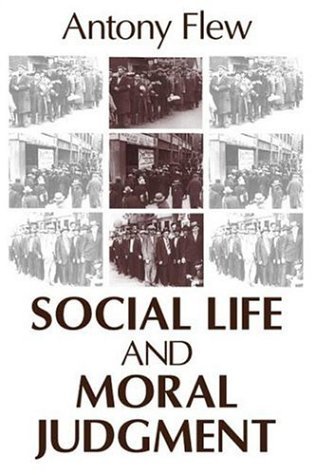Social Life and Moral Judgment
by Antony Flew
New Brunswick, NJ: Transaction; 179 pp., $34.95
Antony Flew is one of Britain’s most lucid analytical philosophers and the most skilled demolisher of the myths of social justice that his country has ever produced. His new book, published in the United States, should prove of great interest to Americans as well as to his compatriots and will be valued by traditional conservatives and enthusiasts for the free market alike.
As in his earlier work on crime and disease, Flew confronts those social determinists who, using the language of science, seek to excuse deviant behavior. He shows with great clarity that these people confuse physical causes with moral ones that work through individual choice; we can never say of a person’s actions that it was physically impossible for him to act other than as he did. Flew further develops this argument to demolish the central theses of the overrated American socialist John Rawls.
I had not realized before Flew drew my attention to it that Rawls believed that no human qualities or virtues whatsoever deserve reward but are entirely arbitrary from “a moral point of view.” For Rawls, even the “willingness to make an effort” is “dependent upon happy family and social circumstances.” In Rawls’ view, the possession of virtue is merely one more undeserved inequality needing redress. Rawls might well wish virtue to be rewarded for expedient reasons, but how is it possible to do so if no one believes that such a reward is deserved and not merely an arbitrary imposition? In Rawls’ world, all are justified sinners. Rawls claims that his view of humanity allows equally for a private-property, free-market, or socialist economy. Yet, as Flew shows, it is difficult to see how his views are compatible with anything short of complete socialism, since nothing less could give reality to his speculative fantasies. Unless all property and incomes belong to the state, what is the point of considering how they might be reapportioned? Flew demonstrates that to put the word social in front of any term is to deprive it of its true meaning (e.g., a “social worker” is not a worker, “social democracy” is not democracy, a “social market economy” is not a market economy, “social justice” is not justice, etc.)
Flew’s arguments concerning social causation are essentially conservative ones (or have conservative implications), and he bolsters them with American as well as British examples. Flew is particularly strong on aggregate “inequalities” in health and longevity, which, he shows, are more the result of the choices individuals make than of differences in wealth and income. Interestingly, he chooses to illustrate this point by reference to the far higher death rates in godless Nevada than in pious Utah: The wages of sin—in a very literal sense—is death. No doubt some would object that it is the communal nature of the churches and their moderation, by tithing and charity, of inequalities among individuals that make Utah healthier than Nevada. If so, Flew—who regards such associations as churches and families as voluntary associations for human betterment (the antithesis of a compulsory state-welfare system)—would probably agree with them. Indeed, he repeatedly stresses that the single greatest social factor that positively correlates with a person’s chances in life is to have had parents who remained married throughout his childhood. Here, in a sense, is the central paradox of the welfare state: Attempts to compensate those who have lacked this particular advantage tend, indirectly but massively, to increase the numbers of those who are thus disadvantaged. To put it bluntly: The more welfare, the more bastards. Perhaps even more significantly, Flew shows that it also works the other way round, the taxation system having induced not only a declining incidence of marriage but a falling birthrate within marriage.
Flew uses his analytical skills to demolish what has become dogma in both Britain and America—namely, the idea that it is not possible to make distinctions of quality among cultures. The complexity of cultures and the arbitrariness of value judgments give this notion a certain plausibility. However, Flew presses the point that some cultures are demonstrably far superior to others when viewed instrumentally. Regardless of whether we can judge them for what they are intrinsically, we can rank them in terms of what they make possible. While Flew wins the argument, however, he has almost certainly lost the debate in respect of a question on which Britain has become even more close-minded than America (as a careful reading of Flew’s endnotes makes clear). The persecution of Ray Honeyford—who was forced out of his job as headmaster of a school in an area of Yorkshire with a large Muslim population on account of a culturally frank article he had written—and the subsequent suppression of his book attacking the Commission for Racial Equality demonstrate the fact clearly.
Still, Professor Flew deserves congratulations for having added yet another book to his shelf of clearly written, hard-hitting works that demolish the compulsory assumptions of our times.

Leave a Reply